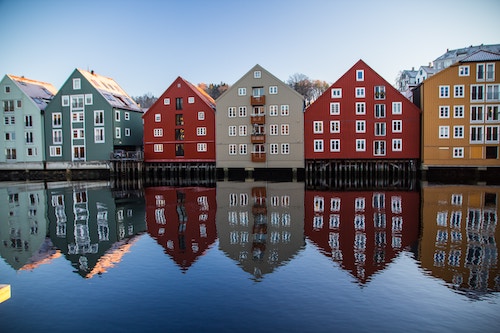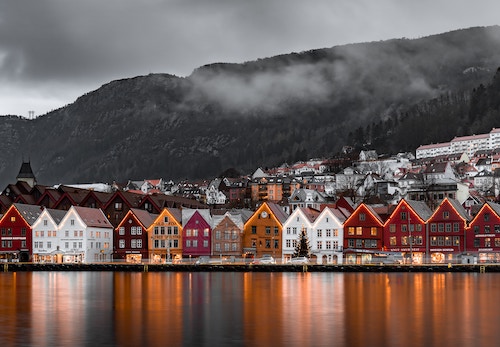Norway is a member of the European Free Trade Association (EFTA), together with Iceland, Lichtenstein and Switzerland. Relations between the EFTA and EU countries are defined by the European Economic Area (EEA) Agreement which upholds the four freedoms of the European Union: free movement of goods, people, freedom of establishment and provision of services, and freedom of capital between member states.According to the 2019 Index of Economic Freedom, Norway, with a population of 5.3 million and 4.2% unemployment, is ranked 14th out of 44 countries in the European area. A thriving private sector supports the state sector and public / social services.
Norway is rich in natural resources and the main industry sectors are petroleum, gas and hydro-electric power. The country is also a world leader in sea farming, production and export. The shipping industry and tourism are also significant. Potential growth areas have been identified as aluminium, healthcare, fisheries, and green technology.
Work Permits
Requirements for securing employment in Norway depend on whether the jobseeker comes from one of the Nordic countries: Denmark (including Greenland and the Faroe Islands), Finland, Iceland, Norway, and Sweden; from another EU/EEA state, or from outside the EU/EEA.

Nordic residents can apply for a job, find local accommodation and register for work. An EU/EEA resident must complete the job application process and verify that their qualifications match Norwegian requirements before relocating.
A visitor’s visa (60€) is required for non-EU/EEA nationals who wish to visit the country prior to taking up permanent employment.
Work permits are required for foreign nationals outside the EU/EEA and must be secured prior to commencing employment. A work permit costs approximately 140€ and applications can take up to two months for approval. There are no specific quotas or country specific priorities.
You will be enrolled in the Norwegian National Insurance Scheme on the day your employment starts. However this does not apply if you are relocating on a temporary basis as an employee of a non-Norwegian company. Membership of the National Insurance Scheme determines any entitlements you may receive from the Norwegian Labour and Welfare Administration (NAV).

Learning Norwegian is not mandatory. However, with unemployment at only 4.2%, you will be in competition with native job seekers and therefore language skills and qualifications will significantly enhance your prospects.
Job Sites
The NAV database lists all published jobs in Norway, and although these are predominantly in Norwegian, English-language searching is enabled.
The Norwegian government requires certain qualifications for specific professions. A full list of industries and the qualifications required can be found on the website of the Norwegian Agency for Quality Assurance in Education (NOKUT).
The following websites specialise in English language speaking vacancies in Norway: Jobs in Oslo, which also links to Jobs in Bergen and Trondheim, and The Local. International agencies Indeed, Adecco and Manpower all cover Norway.

Jobs are also advertised in the press and on employers’ websites. It is also perfectly acceptable to contact prospective employers directly, even if they are not advertising vacancies.
Applying For A Job
Your CV should consist of 1-2 pages and be tailored for individual applications. Standard CVs can be registered with local agencies and uploaded digitally to employment websites. Personal details should include your date of birth, marital status and number of children if applicable. Some employers prefer to see key qualifications and years of experience listed at the beginning of the document. Education and work information should be presented with most recent details first.
The CV should include work and vocational experience, qualifications, relevant courses, and positions of trust in external organisations, such as school governor appointments, sports clubs and so on. Language and IT skills, hobbies and interests should also be included. You should state that references are available on request. You will be required to supply documentary evidence for any qualifications or certificates mentioned. If required, original documents should only be produced at interview.
NAV run regular job fairs and many universities and colleges hold specialist career days. Job fairs comprise Trade, Education & Training and Jobs & Careers. The majority of trade fairs are held in the town of Lillestrom. The Trade Fair Dates website lists forthcoming events and can be searched by region, industry sector, city and date range.
Contracts And Remuneration
A written job contract is mandatory and must be in place no later than one month from the employment start date. It details roles, responsibilities, location, any probation period, notice period, working hours and holiday entitlement.
It is not unusual for employment to be governed by some form of collective agreement. The two main collective bodies are the Confederation of Norwegian Enterprise (Næringslivets Hovedorganisasjon, NHO) and the Norwegian Confederation of Trade Unions (Landsorganisasjonen i Norge, LO). There is a range of unions and employers who are entitled to enter into collective agreements.

There is no official minimum wage in Norway and remuneration packages are agreed between employer and candidate during the interview process. However, if employment is subject to a collective agreement, specific pay bands may be included in the terms of the agreement. Particular sectors to which this applies are construction, maritime and shipbuilding, agriculture and gardening.
Working hours are a maximum of 9 hours per day with a total of 40 hours per week. A worker is entitled to a 30-minute break when working 5 or more hours consecutively. There must also be a continuous 11-hour period off work per 24 hours. Additional regulations apply for shift workers.
Workers are entitled to 25 vacation days per year. In Norway, Saturday is considered a working day, therefore the minimum holiday entitlement is four weeks and one day. Holiday pay must be 10.2% of the annual remuneration. However, under many collective agreements, an entitlement of 5 weeks is granted and holiday pay is 12% of the annual remuneration.

Holiday pay is governed by the Holidays Act. The employee’s salary is deducted for the holiday period and substituted by holiday pay based on the previous year’s remuneration. This must be paid in advance of the holiday period.
Cost Of Living In Norway
Overall, the cost of living in Oslo is 6.7% less than London. Restaurants are 24.9% cheaper, groceries 33.8%, transportation 30%, clothing 22%. However, housing is 51.7% higher, entertainment & sport 5.1%, and childcare is 2.3 times more expensive.
The cost of living in Oslo overall is 8.1% higher than New York. Housing is 15.9% more expensive and childcare is twice as much as in New York. However, restaurants are 28% cheaper, groceries 5.1%, transport 3.8%, entertainment & sport 21.3%, and clothing 38.6%.
Would you like to share your experience of life abroad with other readers? Answer the questions here to be featured in an interview!

